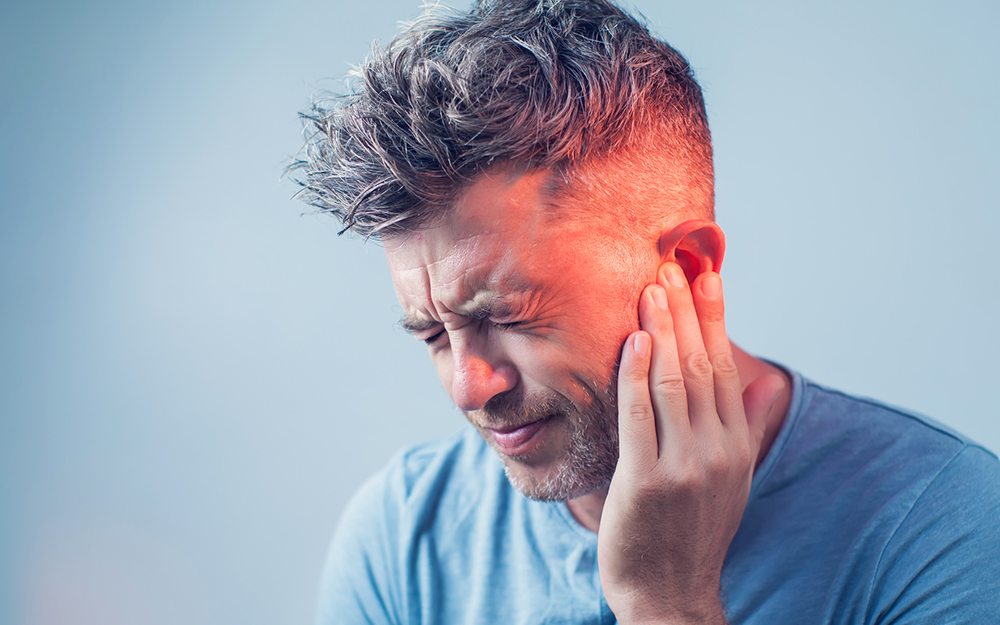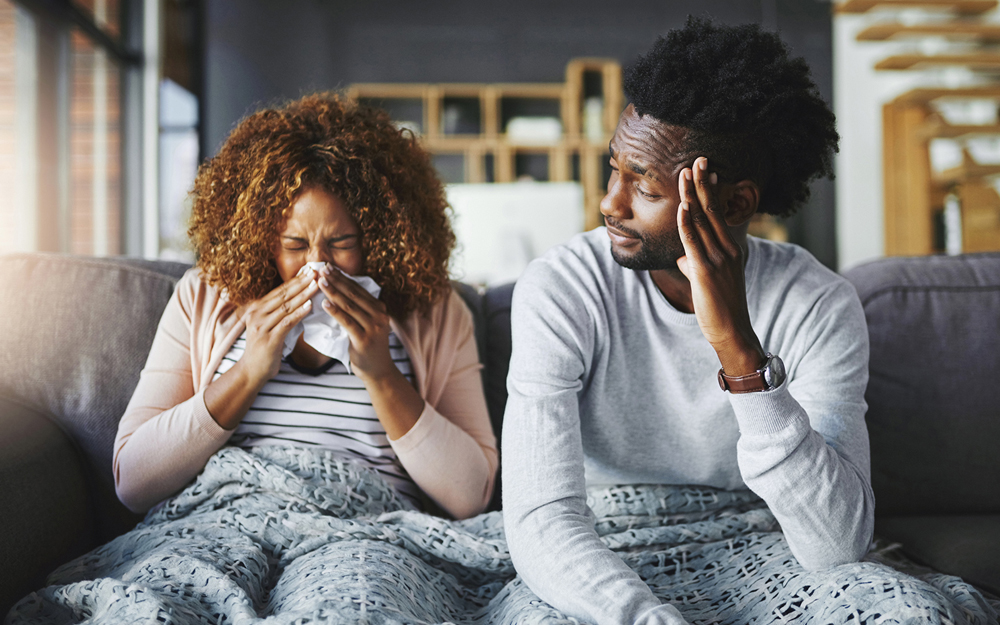Managing Tinnitus: Why Are My Ears Ringing?
Date
November 12, 2021
Credits

Date
November 12, 2021
Credits
Medical providers featured in this article

In Brief
{{cta-block}}
It could be high-pitched ringing, roaring, buzzing, static or even a cricket-like chirp. Whatever the sound, waking up one day with a noise that wasn't there before, and doesn't seem to be caused by anything around you, is jarring.
Known as tinnitus, the condition affects more than 50 million Americans, according to the American Tinnitus Association (ATA). About 20 million people experience chronic cases, and it's debilitating for about 2 million.
{{providers}}
And it's not all in your head: The diverse sounds can stem from trauma due to loud noises, damaged nerve endings or stiffened bones in your ear, thyroid or jaw problems, head or neck injury or illness—including COVID-19 and its lasting effects, according to emerging research. Stress can also exacerbate the condition, which has made the pandemic ripe for a rise in tinnitus, says Cedars-Sinai otolaryngologist Dr. Yu-Tung Wong.
While the causes and frequency vary, if it doesn't resolve on its own, tinnitus can quickly become overwhelming and take an emotional toll.
"People are always told, 'There's nothing you can do,'" Dr. Wong says.
"You have to come to an understanding about it," he adds. But don't feel helpless: There are ways to manage its effects and improve your quality of life.
"It can creep up on people, where you have hearing loss related to noise exposure, noise trauma or other things like that, and you don't realize it."
Find out what's going on
Tinnitus itself isn't dangerous, but it's often linked to hearing loss. If you're experiencing new-onset tinnitus, talk with your primary care provider, who can refer you to an audiologist for a hearing test.
"It can creep up on people, where you have hearing loss related to noise exposure, noise trauma or other things like that, and you don't realize it," Dr. Wong says.
Sometimes, your hearing sensitivity may have declined in ultra-high frequencies that aren't detected on a standard audiogram.
Tinnitus also could be a maladaptation. Your brain can hardwire a hyperactive response to intense sound that persists even after the noise is gone and the ear has recovered.
Further, nearly 15% of patients report experiencing tinnitus after contracting SARS-CoV-2, the virus that causes COVID-19.
Determining underlying issues may uncover a resolvable cause. For example, a buildup of earwax can create a ringing effect.
Dr. Wong cautions that any sound with unusual features, such as only occurring in one ear, a link to significant hearing loss in just one ear or a pulsing sensation that matches your heartbeat, requires additional medical examination.
Treat related conditions
Work with your doctor to craft a care plan specific to your tinnitus.
Hearing aids or cochlear implants might provide relief for hearing loss, while medications can target causes and symptoms such as mood, sleep, temporomandibular joint disorder and thyroid health.
If you experience tinnitus as a persistent or worsened symptom post-COVID-19, see your primary care provider. At Cedars-Sinai, physicians can refer you to the COVID-19 Recovery Program, where specialists treat and research long-haul effects of the disease.
Studies are ongoing for both long COVID-19 and experimental tinnitus therapies, the ATA notes.
Although tinnitus does not currently have a cure, audiologists and otolaryngologists frequently offer tinnitus retraining therapy. This consists of maskers, sound-therapy devices that help to muffle the ringing or roaring, and counseling. This long-term process exposes you to different sounds, training your brain to be less responsive to the tinnitus noise.
Follow a healthy lifestyle
Taking care of your wellbeing has benefits for your ears.
Eat a nutritious diet, cut back on sodium and salt and follow medical advice to keep existing diabetes, high or low blood pressure or high cholesterol—all tinnitus risk factors—in check.
Make sure to also get enough physical activity and rest. Insufficient sleep and stress can set off migraines and headaches. Migraines, in turn, worsen tinnitus symptoms. The pressures of tinnitus can also cause tension headaches.
"There's a lot of inter-connectivity between tinnitus and other disease processes," Dr. Wong explains. "They go hand in hand."
Avoid both loud surroundings and complete silence
Noisy environments can trigger your tinnitus, but complete silence might make the ringing more noticeable, Dr. Wong says.
He suggests seeking out spaces with light background sound such as a fan, air conditioner, radio or white noise machine.
This can create a "distraction for your brain."
Learn to cope with negative feelings
Tinnitus can hurt quality of life over time, leading many people to experience mental health challenges such as depression and anxiety.
The condition is often more physically and emotionally draining when your mind is taxed, so stress reduction and relaxation are crucial, experts say.
If you continue to struggle, cognitive behavioral therapy with a licensed psychologist might help ease the burden. CBT offers effective strategies for living with tinnitus without letting it overwhelm you.
Focus on what's most important
Meditation and mindfulness are powerful tools to ground yourself and shift your attention to what matters to you. They can be integrated into behavioral therapy, such as mindfulness-based stress reduction, or practiced on your own at home.
"The more you think about the sound, the louder it gets," Dr. Wong says. "So, if it becomes something you're paying attention to for a long period of time, then it can be much harder for it to fade away to the background."





